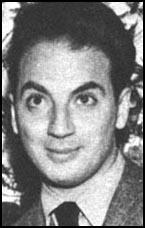Clifford Odets

Clifford Odets, the son of Jewish immigrants, was born in Philadelphia, on 18th July, 1906. He left school at the age of 17 to become an actor. After a series of small parts working in the theatre and on radio, Odets helped form the Group Theatre in New York City. Members held left-wing political views and wanted to produce plays that dealt with important social issues.
Odets, who joined the American Communist Party in 1934, had his first play produced, Waiting for Lefty, in 1935. The play that dealt with trade union corruption, was an immediate success. With his next two plays, Awake and Sing! and Till the Day I Die, Odets established himself as a champion of the underpriviledged.
After the production of Paradise Lost (1935), Odets accepted a lucrative offer to become a film screenwriter and while in Hollywood met and married the actress, Luise Rainer. However, he continued to write plays and with Golden Boy (1937) he had his greatest commercial success. This was followed by Rocket to the Moon (1938), Night Music (1940) and Clash By Night (1941).
A non-conformist actress, Rainer refused to accept the values of Hollywood. In 1937 Rainer had to be forced by Louis B. Mayer to receive her Oscar. She later claimed that: "For my second and third pictures I won Academy Awards. Nothing worse could have happened to me." The studio insisted on forcing her into roles she considered unworthy of her talents. “All kinds of nonsense... I didn’t want to do it, and I walked out." Mayer said, "That girl is a Frankenstein, she’s going to ruin our whole firm... we made you and we are going to destroy you". Rainer decided to leave Hollywood. The director, Dorothy Arzner, claims that she was being badly treated because she had married a communist.
Odets and Luise Rainer moved to New York City. They also spent time in Nichols, Connecticut. Rainer said that Odets was ''my passion’’ but was a possessive man. When Rainer developed a friendship with Albert Einstein, Odets was said to be so consumed with jealousy that he savaged a photograph of Einstein with a pair of scissors. The couple were divorced in 1943.
Odets also wrote The Big Knife (1949), and The Country Girl (1950). Investigated by Joseph McCarthy and the House Un-American Activities Committee in 1953, Odets argued that he had never been under the infuence of the American Communist Party and his work had been based on his deep sympathy for the working classes. Unlike many writers and actors who had been members of the party, Odets was not blacklisted and continued to work in Hollywood. This included the screenplay for the acclaimed, Sweet Smell of Success (1957).
Clifford Odets died on 18th August, 1963.
